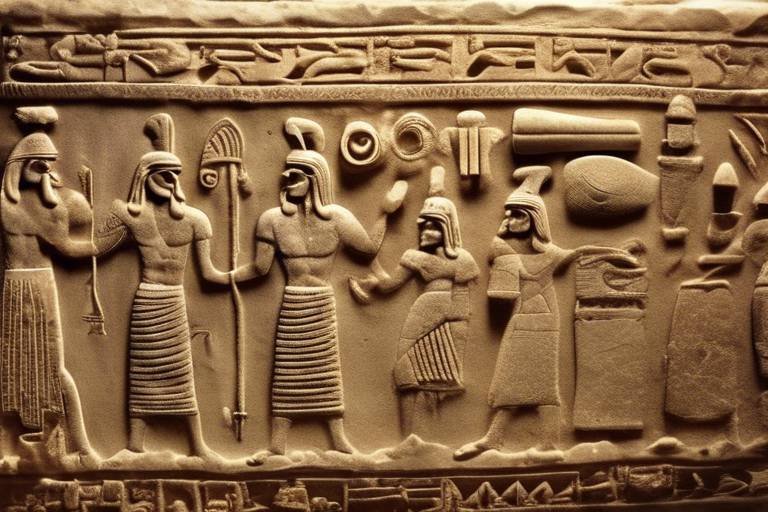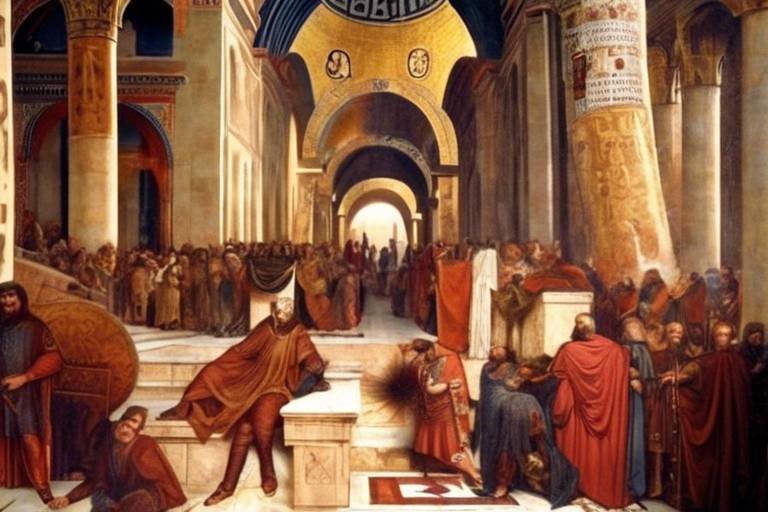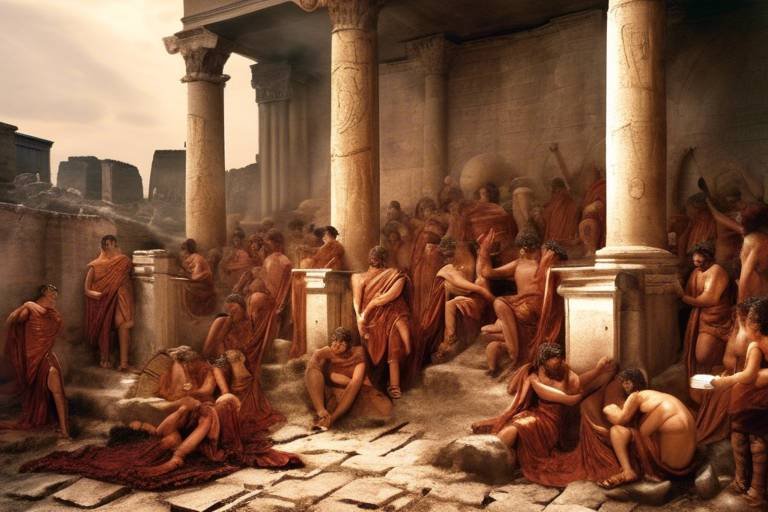The Lost Kingdom of Benin - Cultural Insights
The Lost Kingdom of Benin holds a treasure trove of cultural insights waiting to be discovered. Nestled in the heart of Africa, this ancient kingdom beckons us to unravel its mysteries and delve into the depths of its rich heritage. From the intricate artifacts to the vibrant traditions, the Kingdom of Benin offers a glimpse into a civilization that thrived centuries ago, leaving behind a legacy that continues to resonate in the present day.
As we embark on this journey of exploration, we are transported back in time to witness the grandeur and glory of the Kingdom of Benin. Its history, steeped in tales of conquests and achievements, reveals a society that was not only advanced in its political structure but also renowned for its artistic prowess. The rise and fall of this powerful kingdom paint a vivid picture of a civilization that stood as a beacon of culture and sophistication in its era.
One of the most captivating aspects of the Kingdom of Benin is its remarkable bronzes and artifacts. These masterpieces of artistry not only showcase the skill and creativity of the Benin craftsmen but also hold immense historical significance. However, the controversies surrounding the looting and repatriation of these treasures serve as a stark reminder of the challenges faced in preserving the cultural heritage of this ancient kingdom.
At the heart of the Kingdom of Benin lies a unique system of governance that has fascinated historians and scholars alike. The roles of the Oba, the chiefs, and the councils in decision-making and administration provide a glimpse into a society that valued order, tradition, and hierarchy. The intricate web of power dynamics within the kingdom sheds light on the complexities of governance in ancient Africa.
Religious and spiritual practices formed a central part of life in the Kingdom of Benin, with a blend of indigenous beliefs and external influences shaping the spiritual landscape of the society. The reverence for various deities, the performance of rituals, and the celebration of cultural festivals all reflect the deep-rooted spiritual connection that guided the lives of the Benin people.
As we reflect on the enduring legacy of the Kingdom of Benin, we are reminded of its profound impact on modern-day Nigeria and Africa as a whole. The influence of Benin art, governance principles, and cultural identity continues to echo through the corridors of time, shaping the narratives of history and shaping the cultural landscape of the region.
In recent years, efforts to rediscover and preserve the heritage of the Kingdom of Benin have gained momentum, with archaeological excavations and cultural conservation projects shedding new light on this ancient civilization. These initiatives not only aim to safeguard the legacy of the kingdom but also to create awareness about its significance in the annals of African history.
The cultural insights gleaned from the lost Kingdom of Benin serve as a beacon of inspiration for contemporary African societies, influencing art forms, governance structures, and historical narratives. The echoes of the past resonate in the present, reminding us of the enduring legacy of a civilization that once thrived in the heart of Africa.

History of the Kingdom of Benin
The Kingdom of Benin holds a fascinating history that dates back centuries, characterized by a rich tapestry of events that shaped its rise and eventual decline. Originating in the region now known as Nigeria, the Kingdom of Benin flourished as a powerful empire renowned for its sophisticated political structure, elaborate artworks, and influential monarchs.
Founded around the 11th century, the Kingdom of Benin saw a period of remarkable growth under the reign of successive Oba (kings) who wielded significant power and authority. These rulers oversaw the expansion of the kingdom's territory, the establishment of trade routes, and the development of a thriving cultural hub that attracted artisans, traders, and scholars from far and wide.
One of the most notable aspects of the Kingdom of Benin was its intricate system of governance, which featured a hierarchical structure led by the Oba. Supported by a council of chiefs and elders, the Oba played a pivotal role in decision-making, law enforcement, and the preservation of the kingdom's traditions.
However, the zenith of Benin's power was followed by a period of external pressures and internal strife, leading to its eventual conquest by British forces in the late 19th century. This marked a tumultuous chapter in the history of the kingdom, as its artifacts were looted, its rulers deposed, and its cultural heritage threatened.
Despite facing colonization and the loss of its independence, the legacy of the Kingdom of Benin endures through its art, artifacts, and oral traditions. Today, efforts are underway to preserve and showcase the cultural heritage of Benin, shedding light on its significance in the broader narrative of African history and civilization.

Benin Bronzes and Artifacts
Exploring the rich cultural heritage of the ancient Kingdom of Benin and the significance of its artifacts, history, and traditions in understanding the African civilization and legacy.
Delving into the origins, rise, and fall of the powerful Kingdom of Benin, known for its advanced political system, intricate artistry, and notable rulers.
The Benin Bronzes and artifacts are a testament to the artistic mastery of the Benin people. These intricately crafted bronze sculptures and plaques showcase the rich cultural heritage and artistic skills of the kingdom. Each piece tells a story, depicting historical events, rituals, and the royal court with exquisite detail.
However, the history of these artifacts is marred by controversy due to their looting during the colonial era. The debate over their rightful ownership and calls for repatriation have sparked international discussions on cultural heritage and restitution.
Examining the unique system of governance in the Kingdom of Benin, including the roles of the Oba (king), chiefs, and councils in decision-making and administration.
Exploring the spiritual beliefs, rituals, and deities revered in the Kingdom of Benin, highlighting the blend of indigenous practices with external influences.
Celebrating the vibrant cultural festivals of the Benin people, such as the Igue festival and the Emobo ceremony, showcasing their traditions and customs.
Evaluating the enduring legacy of the Kingdom of Benin on modern-day Nigeria and Africa, including its impact on art, governance, and cultural identity.
Discussing recent initiatives to rediscover and preserve the heritage of the Kingdom of Benin, including archaeological excavations and cultural heritage conservation projects.
Analyzing how the cultural insights from the lost Kingdom of Benin continue to influence contemporary African societies, art forms, and historical narratives.
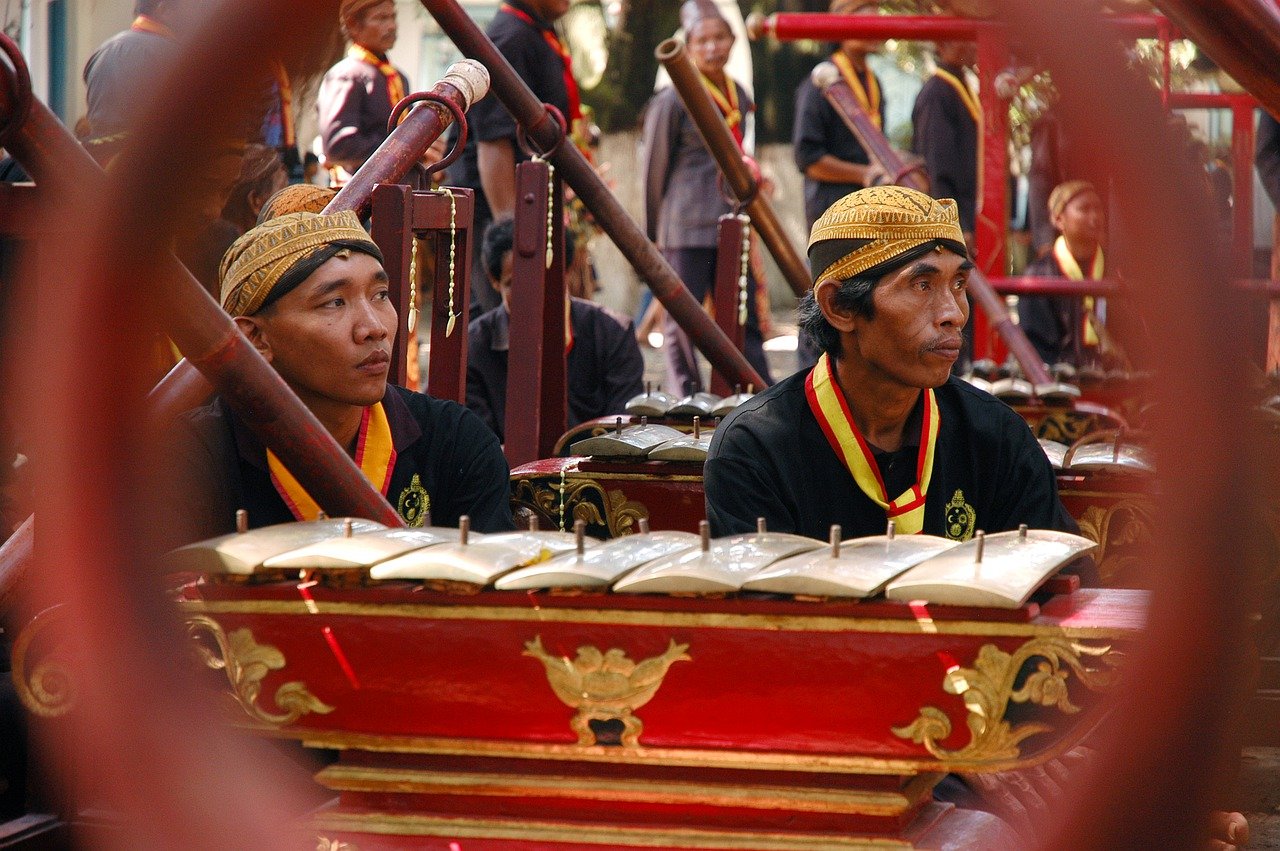
Traditional Benin Governance
The traditional governance system of the Kingdom of Benin was a sophisticated and hierarchical structure that played a crucial role in the administration and decision-making processes of the kingdom. At the pinnacle of this system was the Oba, the revered king of Benin, who held significant power and authority over the kingdom. The Oba was not only a political leader but also a spiritual figure, believed to have divine connections and responsibilities.
Assisting the Oba were various chiefs and council members who formed the inner circle of governance. The chiefs, appointed based on their lineage and merit, held specific responsibilities within the kingdom and advised the Oba on various matters. These chiefs were respected figures in Benin society and played a vital role in maintaining order and harmony.
The traditional councils in Benin, such as the Council of Elders and the Council of Chiefs, served as advisory bodies to the Oba and helped in the decision-making process. These councils deliberated on important issues affecting the kingdom and provided valuable insights and recommendations to the Oba. The collective wisdom of these councils contributed to the stability and prosperity of the kingdom.
Furthermore, the system of governance in Benin emphasized the importance of hierarchy, respect for authority, and adherence to established customs and traditions. The Oba's word was considered final, and disobedience or disrespect towards the monarch was met with severe consequences. This strict adherence to hierarchy and protocol ensured order and unity within the kingdom.
Overall, the traditional governance system of the Kingdom of Benin was a well-structured and organized framework that balanced power, authority, and consultation. It reflected the cultural values and principles of the Benin people, highlighting the significance of leadership, respect, and collective decision-making in maintaining a thriving society.

Religious and Spiritual Practices
In the Kingdom of Benin, religious and spiritual practices played a central role in the daily lives of its people, shaping their beliefs and cultural expressions. The Benin people revered a pantheon of deities, with the Oba serving as the intermediary between the spiritual realm and the earthly domain. Rituals and ceremonies were conducted to honor these deities, seeking their blessings for prosperity, fertility, and protection.
The religious practices of the Benin kingdom were deeply intertwined with their social structure and governance. The Oba, as the divine ruler, held significant spiritual authority and was responsible for maintaining harmony between the human and spiritual worlds. The palace and shrines were sacred spaces where rituals were performed, symbolizing the connection between the earthly realm and the divine.
One of the most prominent deities in Benin religion was Osanobua, the supreme god believed to be the creator of the universe. Offerings and sacrifices were made to appease Osanobua and seek guidance in times of need. Additionally, ancestral veneration was an essential aspect of Benin spirituality, honoring the spirits of departed kings and elders for their wisdom and protection.
The spiritual practices of the Benin people reflected a blend of indigenous beliefs with influences from neighboring cultures and trade routes. This syncretism enriched their religious traditions, incorporating elements of Yoruba, Igbo, and European religions into their worship. The Benin kingdom's spiritual legacy continues to resonate in modern-day Nigeria, inspiring rituals, art forms, and cultural ceremonies that uphold the ancestral connections and divine heritage of the past.

Benin Cultural Festivals
Benin Cultural Festivals are a vibrant reflection of the rich traditions and customs of the Benin people, offering a glimpse into their cultural heritage and values. One of the most significant festivals is the Igue festival, a period of spiritual renewal and thanksgiving to the ancestors. During this colorful event, the Oba of Benin performs sacred rites, symbolizing the continuity of the kingdom's legacy and the prosperity of its people. The festival is a time of feasting, music, dance, and prayer, uniting the community in celebration and reverence for their history.
Another noteworthy cultural event is the Emobo ceremony, a ritual that highlights the importance of the Oba in Benin society. This ceremony reaffirms the Oba's divine kingship and spiritual authority, emphasizing the connection between the ruler, the people, and the ancestral spirits. Through intricate performances, symbolic gestures, and traditional offerings, the Emobo ceremony underscores the enduring traditions and beliefs that shape the identity of the Benin kingdom.

Legacy of the Kingdom of Benin
The legacy of the Kingdom of Benin stands as a testament to the rich cultural heritage and historical significance of this ancient African civilization. The impact of Benin's art, governance, and traditions continues to reverberate through modern-day Nigeria and beyond, shaping the identity of African societies and influencing contemporary art forms.
One of the most notable legacies of the Kingdom of Benin is its remarkable artistic tradition, exemplified by the renowned Benin bronzes and artifacts. These exquisite pieces of art not only showcase the artistic mastery of the Benin people but also provide valuable insights into the history and cultural practices of the kingdom. The intricate detailing and craftsmanship of the bronzes serve as a lasting tribute to the artistic prowess of the Benin civilization.
Furthermore, the governance system established by the Kingdom of Benin has left a lasting impact on the political landscape of the region. The role of the Oba, or king, as the central authority figure, along with the hierarchy of chiefs and councils, reflects a sophisticated system of governance that ensured stability and order within the kingdom. This traditional system of governance has influenced the political structures of contemporary African societies and continues to be studied for its effectiveness and resilience.
In addition to its artistic and political legacy, the Kingdom of Benin has also made significant contributions to the cultural identity of Africa. The spiritual beliefs, rituals, and cultural practices of the Benin people have been preserved through generations, providing a link to the past and a source of pride for present-day communities. The vibrant cultural festivals of the Benin people, such as the Igue festival and the Emobo ceremony, serve as living expressions of the kingdom's rich cultural heritage.
As efforts to rediscover and preserve the heritage of the Kingdom of Benin continue to gain momentum, the legacy of this ancient civilization is being safeguarded for future generations. Archaeological excavations and cultural heritage conservation projects play a crucial role in ensuring that the history and traditions of the Benin people are not lost to time. By preserving the artifacts, historical sites, and cultural practices of the kingdom, the legacy of Benin is being honored and celebrated.

Rediscovery and Preservation Efforts
Efforts to rediscover and preserve the rich heritage of the Kingdom of Benin have gained momentum in recent years, shedding light on the historical significance of this ancient civilization. Archaeological excavations and cultural heritage conservation projects have played a crucial role in uncovering the lost treasures of Benin and safeguarding them for future generations.
One notable initiative in preserving the legacy of the Kingdom of Benin is the establishment of museums and cultural centers dedicated to showcasing its artifacts and history. These institutions serve as educational hubs, offering insights into the artistic mastery and cultural practices of the Benin people.
Collaborations between local communities, historians, and international organizations have also been instrumental in raising awareness about the importance of preserving Benin's cultural heritage. By working together, stakeholders aim to protect the artifacts from looting and ensure their rightful repatriation to the Kingdom of Benin.
Furthermore, advancements in technology, such as 3D scanning and digital archiving, have provided innovative ways to document and preserve the intricate details of Benin bronzes and artifacts. These digital replicas not only serve as valuable resources for research but also help in safeguarding the originals from damage or loss.
Through these collective efforts, the rediscovery and preservation of the Kingdom of Benin's cultural heritage continue to thrive, offering a glimpse into the past glory of this remarkable civilization and inspiring future generations to cherish and protect their cultural legacy.
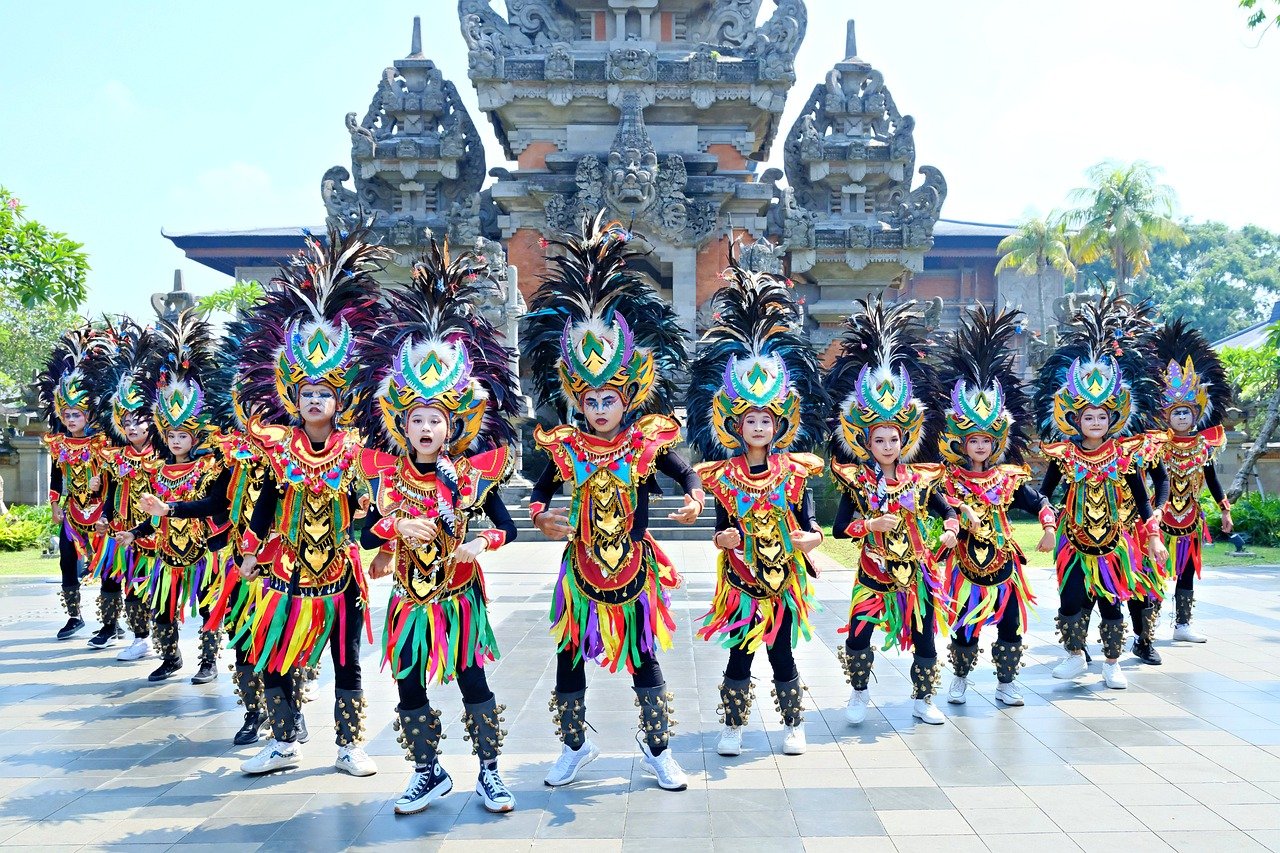
Impact of Benin Civilization Today
The impact of the ancient Kingdom of Benin on contemporary African societies is profound and far-reaching. Despite the kingdom's eventual decline, its cultural legacy continues to shape various aspects of modern-day Nigeria and Africa as a whole. One of the most significant influences is seen in the realm of art and craftsmanship. The intricate designs and artistic techniques of Benin bronzes and artifacts have inspired generations of African artists, contributing to the vibrant art scene prevalent in the region today.
Moreover, the traditional governance system of the Kingdom of Benin has left a lasting impact on the political landscape of Nigeria. The concept of a centralized authority, with the Oba at its helm, has influenced the structure of governance in the country, highlighting the enduring relevance of historical institutions in shaping contemporary politics. The principles of leadership and administration practiced in the kingdom still resonate in the governance frameworks of many African communities.
Furthermore, the religious and spiritual practices of the Benin people have endured through time, blending indigenous beliefs with external influences to create a unique spiritual tapestry. The reverence for ancestral spirits, deities, and rituals in Benin culture continues to be preserved and practiced, showcasing the resilience of traditional beliefs in the face of modernization and globalization.
On a broader scale, the legacy of the Kingdom of Benin serves as a reminder of Africa's rich cultural heritage and historical significance. By studying and appreciating the contributions of ancient African civilizations like Benin, contemporary societies can gain a deeper understanding of their roots and identity, fostering a sense of pride and connection to the continent's diverse past.
Frequently Asked Questions
- What is the significance of the Kingdom of Benin in African history?
The Kingdom of Benin holds great significance in African history due to its advanced political system, intricate artistry, and notable rulers. It played a pivotal role in shaping the cultural and artistic landscape of the region, leaving a lasting legacy that continues to influence contemporary African societies.
- Why are Benin bronzes and artifacts important?
Benin bronzes and artifacts showcase the artistic mastery of the Benin people and provide valuable insights into the historical and cultural heritage of the Kingdom of Benin. These artifacts are not only exquisite works of art but also serve as a link to the past, offering a glimpse into the rich traditions and craftsmanship of the Benin civilization.
- What are some key cultural festivals of the Benin people?
The Benin people celebrate various cultural festivals, such as the Igue festival and the Emobo ceremony, which are integral to their traditions and customs. These festivals serve as occasions for communal gathering, spiritual reverence, and the preservation of cultural practices that have been passed down through generations.
- How is the legacy of the Kingdom of Benin preserved today?
The legacy of the Kingdom of Benin is preserved through initiatives such as archaeological excavations, cultural heritage conservation projects, and efforts to rediscover and protect the historical artifacts and sites associated with the kingdom. These preservation efforts aim to safeguard the cultural heritage of Benin for future generations.





